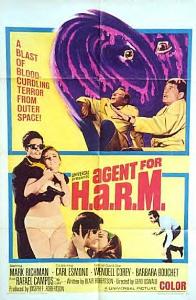This article needs additional citations for verification .(June 2019) |
| Agent for H.A.R.M. | |
|---|---|
 Theatrical release poster | |
| Directed by | Gerd Oswald |
| Written by | Blair Robertson |
| Produced by | Joseph F. Robertson |
| Starring | Mark Richman Carl Esmond Wendell Corey Barbara Bouchet Rafael Campos |
| Cinematography | James Crabe |
| Music by | Gene Kauer Douglas M. Lackey |
| Distributed by | Universal Pictures |
Release date |
|
Running time | 84 minutes |
| Country | United States |
| Language | English |
Agent for H.A.R.M. is a 1966 American science fiction spy thriller directed by Gerd Oswald and starring Mark Richman, one of a number of spy thrillers of the era having conspicuous sci-fi elements; in this case, a fictional spore turns human flesh into a fungus on contact.
Contents
The film was intended to be the television pilot for a new spy series. However, it was later decided that it should be given a theatrical release instead. It was released as a double feature with Wild Wild Winter .